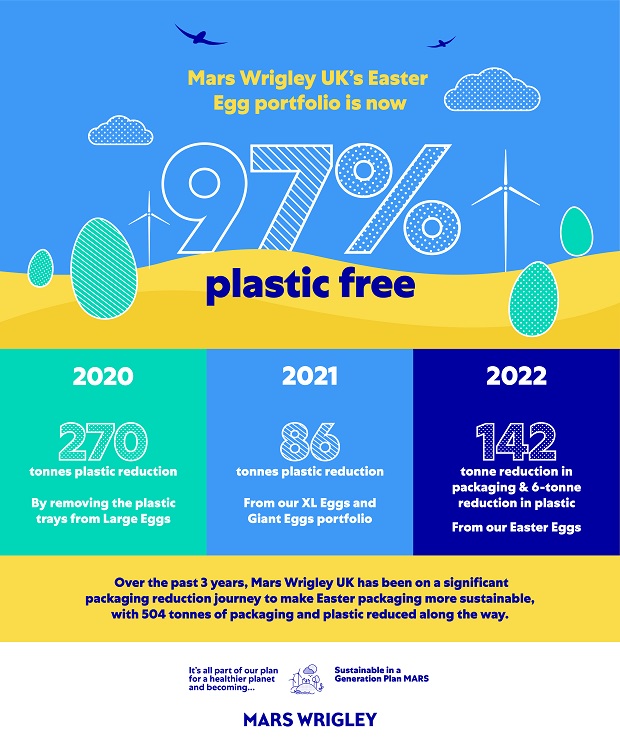The business takes another hop towards improved packaging sustainability with 97% of its Easter Egg portfolio in the UK now plastic free
 Mars Wrigley UK has made a 142-tonne reduction in packaging across its Easter Eggs and a 6-tonne reduction in plastic this Easter. The latest move from the business means that 97% of its Easter Egg portfolio in the UK is now plastic free.
Mars Wrigley UK has made a 142-tonne reduction in packaging across its Easter Eggs and a 6-tonne reduction in plastic this Easter. The latest move from the business means that 97% of its Easter Egg portfolio in the UK is now plastic free.
Over the past few years, the company has been on a significant packaging reduction journey to make Easter packaging more sustainable. In 2020, it announced its first move to remove the plastic trays from Large Eggs, accounting for a 270-tonnes plastic reduction, a significant amount of the seasonal range’s plastic output. This was followed by 86 tonnes of plastic removed from its XL Eggs and Giant Eggs portfolio in 2021 – resulting in a total 504 tonnes of packaging and plastic reduced over the past three years.
Adam Grant, General Manager, Mars Wrigley UK, said: “In the world we want tomorrow, the planet is healthy – which is why we’re taking meaningful action to redesign our packaging portfolio to make it more sustainable. Today’s announcement that 97% of our Easter Egg portfolio in the UK is now plastic free, after the removal of hundreds of tonnes of plastic since 2020, represents our commitment to creating a more sustainable tomorrow and our efforts won’t stop here.”
By redesigning the packaging that Mars Wrigley UK uses to protect delicate Easter eggs as they are transported to shops and into hands across the nation, the business has been able to take another step forward towards Mars Incorporated’s global goal to develop packaging that is 100% reusable, recyclable or compostable.
These efforts are part of Mars’ commitment to achieve net zero greenhouse gas emissions across its full value chain by 2050. The company has already taken tangible action towards this goal, with all Mars bars sold in the UK, Ireland, and Canada to be certified as carbon neutral by 2023. The business will work with an independent auditor to certify the Mars bar as carbon neutral and will be adhering to the PAS 2060 standard for carbon neutrality, which provides radical transparency and is widely considered to be the leading standard of carbon neutral specification.




Comments are closed.